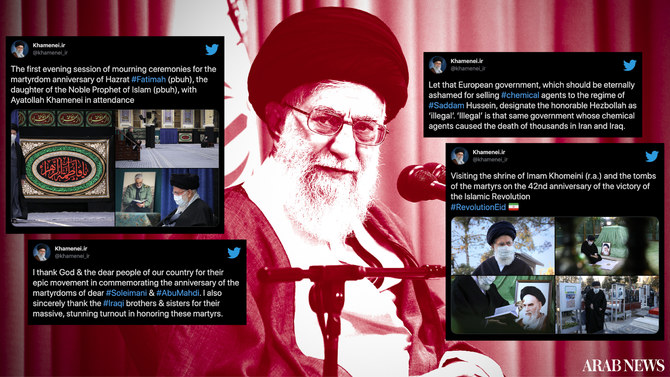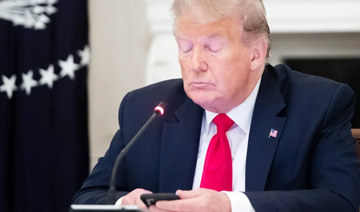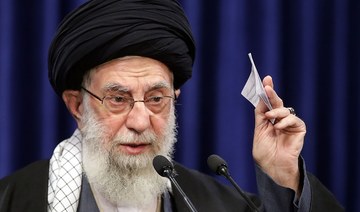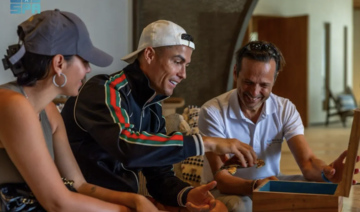DUBAI: Iran’s Supreme Leader Ayatollah Ali Khamenei is notorious for using his Twitter accounts to incite hate, violence and disinformation. Yet his many accounts in multiple languages still exist on the platform.
These accounts, in languages including Persian, English, and Spanish, regularly post content that would – and should – violate Twitter’s policies.
In January, an account linked to Khamenei’s personal office posted a graphic threatening “revenge” while appearing to depict former President Trump under the shadow of a looming airstrike, which was retweeted by one of Khamenei’s personal accounts. Following public backlash, Twitter suspended the account that posted the tweet but not the personal account.
It said it suspended the account due to a violation of its policy against fake accounts.
“The justification that Twitter reportedly gave for why it shut down that particular account but not others was not just unpersuasive, it was preposterous,” David Weinberg, Washington director for international affairs of the US-based anti-hate organization Anti-Defamation League (ADL), told Arab News.
“For one thing, it was followed by and frequently retweeted by other central Khamenei accounts (which were not suspended). It had also been allowed to promote all kinds of problematic content for half a year until then. So, why all of a sudden did it get removed – just a day or two after posting material that was incitement to violence?” he said.
Following the incident, ADL wrote a letter to Twitter CEO Jack Dorsey calling to deplatform all accounts linked to Khamenei without delay for repeated violations of Twitter’s rules that prohibit incitement to hatred and violence.
We welcome @Twitter suspending 1 of #Iran's Khamenei's accounts. But this is not enough. Khamenei incites hate, violence, Holocaust denial & COVID rumors through his 6+ OTHER accounts. I wrote to @Jack demanding that Twitter apply its rules fairly & suspend all his accounts now. pic.twitter.com/i75idZTMOu
— Jonathan Greenblatt (@JGreenblattADL) January 22, 2021
The letter gave examples of how Khamenei’s tweets have continually violated three specific policies – Glorification of Violence, Hateful Conduct and COVID-19 Misleading Information – and urged Twitter to suspend the associated accounts.
Signed by ADL CEO and National Director Jonathan Greenblatt, the letter ends:
“But given that you have already suspended an American president from your platform earlier this month, and just removed one of Khamenei’s many Twitter accounts for its blatant and threatening violations of Twitter’s policies, that standard must urgently be applied to Khamenei’s panoply of other Twitter accounts, which so clearly pose a danger to public safety and routinely violate Twitter’s terms of service.”
Twitter took action last year against ex-president Donald Trump by adding fact-checking and violence labels to his tweets and eventually suspending his account @realDonaldTrump permanently on January 8.
“After close review of recent Tweets from the @realDonaldTrump account and the context around them — specifically how they are being received and interpreted on and off Twitter — we have permanently suspended the account due to the risk of further incitement of violence,” it said.
However, when US Senate Commerce Chair Roger Wicker asked Dorsey in a hearing last year about tweets from Khamenei that “glorified violence,” Dorsey defended the decision to keep them unlabeled on the platform.
He said, “We did not find those to violate our terms of service because we considered them ‘saber rattling,’ which is part of the speech of world leaders in concert with other countries.”
Weinberg commented: “The lesson over and over again from modern human history, as I read it, is that when a fanatical dictator responsible for the slaughter of thousands of his own citizens, as well as horrific violence, and calls for genocide against the other, says what they’re going to do, the international community needs to take that seriously; not just dismiss it as tough talk or posturing or playing to a domestic audience.”
He went on to add that sometimes when “murderous fanatics” say they’re going to commit genocide or eliminate countries or “demonize entire religions and nations of people,” it is genuine.
“It is an expression of their genuine worldview and their genuine intent.”
It was around the same time that Twitter had put labels on Trump’s tweets about widespread fraud in voting by mail and other tweets that it said violated its policies “regarding the glorification of violence based on the historical context of the last line, its connection to violence, and the risk it could inspire similar actions today.”
Replying to the Senator about the double standards of labeling Trump’s tweets but not those of other world leaders, Dorsey said, “We saw the confusion it might encourage and we labeled it accordingly. The goal of our labeling is to provide more context, to connect the dots so people can have more information so they can make decisions for themselves.”
On March 18, Twitter wrote in a blog post that it is “calling for public input” on its approach to world leaders.
“Politicians and government officials are constantly evolving how they use our service, and we want our policies to remain relevant to the ever-changing nature of political discourse on Twitter and protect the health of the public conversation.”
It said that it is consulting with human rights experts, civil society organizations, and academics and has released a public survey in 14 languages including Arabic, English, Spanish and Farsi.
“Ultimately, our aim is to have a policy that appropriately balances fundamental human rights and considers the global context in which we operate,” the post said.
Critics are asking why Twitter does not apply the same policies to all users whether they are private citizens or world leaders.
“Twitter should enforce its terms of service for all users, whether private citizen, elected official or unelected tyrant. Propagating hate, glorifying terrorism and encouraging Holocaust denial should get you kicked off Twitter permanently,” Weinberg said in an ADL blog post titled “Twitter Must De-Platform Iran’s Supreme Leader.”
While there certainly is public interest in being able to have free access to a broad array of information, “it is not in the public interest to have companies providing a platform for incitement to hatred and violence,” he told Arab News.
Furthermore, the public interest argument ignores the fact that “heads of states have their own ways to get their message out” from their own websites and media outlets to proxy organizations.
“To suggest that Khamenei needs to have a Twitter account so people can know his hateful and murderous messages is not just not serving the public interest, but it ignores the fact that he has many other avenues for spreading his propaganda,” said Weinberg.
This argument also misses the fact there is heavy censorship on Twitter within Iran.
“The main thing in terms of information in the public interest, as relates to the Iranian people, is that they should have free access to the Internet, which their government does not permit them to.”
A hearing titled “Disinformation Nation: Social Media’s Role in Promoting Extremism and Misinformation” by the Energy and Commerce Committee, scheduled for March 25, marks the start of a new inquiry on misinformation and disinformation plaguing online platforms.
Twitter CEO Jack Dorsey, Facebook CEO Mark Zuckerberg, and Google CEO Sundar Pichai will testify.



























